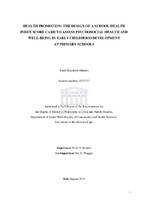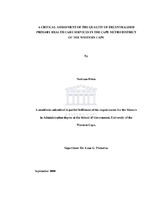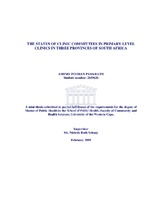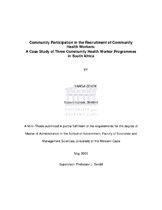Health promotion : the design of a School Health Index Score Card to assess psychosocial health and well-being in early childhood development at primary schools
Abstract
Schools, world-wide, have been regarded as important settings for health promotion and health education. Research indicate that schools constitute a crucial setting for programmes that aim at promoting the health of children, young adults, their families and their community, and could make a positive contribution to the overall health of the society. The psychosocial theory of human development proposes to understand and describe the importance of psychosocial health and well-being of children, in their different stages of development, across the life span, as well as how the different environments of the child's rearing could either add, or hinder, optimal development. Healthy Early Childhood Development, which includes physical, social-emotional, as well as linguistic/cognitive development, is fundamental to success and happiness, not only during childhood, but
throughout the course of life. This study, therefore, aimed to design a School Health Index Score Card that assesses psychosocial health and well-being in Early Childhood Development at primary schools in the rural Western Cape. The School Well-Being Model serves as a conceptual framework for this study and is based on Allardt's Sociological Welfare Theory,which assesses well-being as an entity in a school setting. This model takes into account the impact of family, social relationships, personal self-fulfilment and health aspects of children. This study used a mixed methodological sequential explanatory design that consisted of two
distinct phases (with 2 stages in each phase) within a participatory action research
framework. A needs assessment and a systematic review was conducted in phase 1 followed by phase 2, action planning-design of a school health index score card and a Delphi technique study. Quantitative, numeric, data were collected and analysed using the Statistical Package for Social Sciences V23 (SPSS) for descriptive and inferential statistics first, while the qualitative data were collected and analysed secondly in sequence for this design. The qualitative process helped to explain, or elaborate, on the quantitative results obtained from the respondents by means of a self-administered questionnaire that consisted of three sections; demographical information and the adaptation of the (i) Pediatric Quality of Life Inventory (PedsQL) and (ii) Strengths and Difficulties Questionnaire. The data were collected from teachers, principals, community leaders, parents/primary caregivers, members of school governing bodies, school nurses, social workers, health promotion officers, experts in early childhood development and school psychologists of learners in Grade R to Grade 3 at three primary schools in the rural Western Cape, South Africa. The systematic review of previous studies revealed that, (i) instruments are often designed to identify physical ailments, the individual’s ability to adjust to particular situations, psychiatric diagnosis, educational and intellectual abilities, as well as the personal characteristics of children over their entire lifespan, (ii) that promotion of psychosocial health and well-being challenges in early development does promote positive child development outcomes in later life, and (iii) the use of a valid and reliable instrument to assess psychosocial health and well-being in schools could have a number of advantages for children, their families, teachers and the community. The findings of the current study also indicated that, (i) parents/primary perceived their children to be experiencing challenges in school functioning, social functioning and physical functioning continually and, (ii) teachers perceived the learners to be experiencing social behavioural, hyperactive and behavioural challenges continually at school. Schools play an integral part in the lives of children and their families, by supporting children to form social and emotional relationships at school. Overall, this current study suggested that the School Health Index Score Card was considered to be user friendly, as well as a useful tool to assess the psychosocial health and well-being challenges of learners at primary schools in a South African context.
Collections
Related items
Showing items related by title, author, creator and subject.
-
A critical assessment of the quality of decentralised primary health care services in the cape metro district of the Western Cape
Peton, Neshaan (2009)The complex and multi-facet decentralisation process of Primary Health Care services in the Cape Metro District of the Western Cape will be critically assessed in this thesis. Primary Health Care is the provision of ... -
The status of clinic committees in primary level clinics in three provinces in South Africa
Padarath, Ashnie Pooran (University of the Western Cape, 2009)In South Africa, governance structures in the form of clinic committees, hospital boards and district health councils are intended to provide expression to the principle of community participation at a local and district ... -
Community participation in the recruitment of community health workers: a case study of the three community health worker programmes in South Africa
Zembe, Yanga (University of the Western Cape, 2009)This research investigates the nature and extent of community participation and involvement in the recruitment and selection processes for Community Health Workers (CHWs), primarily through detailed case studies of three ...




